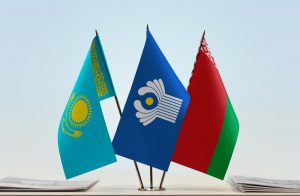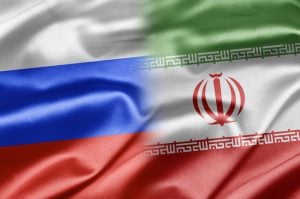Latest news about Bitcoin and all cryptocurrencies. Your daily crypto news habit.

In today’s edition of Bitcoin in Brief we’re focusing on developments in the realm of international politics and economics regarding cryptocurrencies. The Organization of Economic Cooperation and Development is looking into the possible uses of digital coins and the associated technologies. Kazakhstan is calling for the adoption of common crypto rules by the United Nations, while Iran and Russia are thinking about using cryptocurrency in bilateral trade.
Also read: Bitcoin in Brief Wednesday: Coinbase Goes After Big Money as Nomura Creates Komainu
OECD Explores Cryptos and ICOs
 The Committee on Digital Economy at the Organization of Economic Development and Cooperation (OECD) has started exploring blockchain-based cryptocurrencies and Initial Coin Offerings (ICOs). The international body also wants to help governments of member-states develop and implement legislation aimed at protecting consumer rights in electronic trade.
The Committee on Digital Economy at the Organization of Economic Development and Cooperation (OECD) has started exploring blockchain-based cryptocurrencies and Initial Coin Offerings (ICOs). The international body also wants to help governments of member-states develop and implement legislation aimed at protecting consumer rights in electronic trade.
According to Elina Sidorenko, head of Russia’s interdepartmental group working to assess risks and opportunities associated with cryptocurrencies, the OECD will be used as a platform to discuss matters related to cryptos and token sales. These discussions will be held in the context of ensuring the safety of consumers of financial services, she said in a post on her Telegram channel.
The OECD and the Financial Action Task Force on Money Laundering (FATF) recognize the role of cryptocurrency as a means of payment and accumulation, Sidorenko emphasized. Both organizations also view ICOs as a good mechanism to attract funding, she added. “I hope that the generally positive rhetoric on cryptocurrencies in the OECD will not change,” the Russian official said, promising to keep her followers informed on further developments.
Astana Calls for UN Crypto Rules
Kazakhstan’s President Nursultan Nazarbayev thinks that the time has come to adopt common, international rules on cryptocurrencies with the help of the United Nations. “Most countries are actively exploring the possibility to adapt their regulations to the current configuration of the financial system. At the same time, the disconnected actions of different states will lead to inefficiency. It is necessary to develop general rules,” he insisted, quoted by Zakon.kz.
During the Astana Economic Forum, Nazarbayev noted that Kazakhstan’s own project to issue an assets-backed cryptocurrency called G-Global has won institutional support from international organizations. The initiative “has been mentioned on multiple occasions during the G20 summit. Last week the Council of Foreign Ministers at the Organization of Islamic Cooperation, which includes more than 50 nations, adopted a resolution to support it,” the president revealed.
Kazakhstani officials have previously said that G-Global will be designed as a crypto “backed by assets, not just trust.” These assets have not been specified so far but the Central Asian country is rich in natural resources. Kazakhstan is the leading economy in the region, generating 60% of its GDP, primarily through the oil and natural gas industry.
Recent reports that Kazakhstan’s central bank is preparing legislation to ban the sale and purchase of cryptocurrencies, as well as crypto mining, have been dismissed by representatives of the local crypto community. According to Leonid Muravjov, VP at the Blockchain and Crypto Technology Association of Kazakhstan, the government is actually spending huge amounts of money to digitize the economy, which is currently heavily reliant on the export of mineral resources.
Kazakhstan and Belarus to Cooperate on Blockchain
 Astana and Minsk intend to strengthen their ties in the field of blockchain implementation. Kazakhstan and Belarus have signed a memorandum of cooperation that will allow experts from the two former Soviet republics to exchange experience and improve their competitiveness on the world stage through wider adoption of new technologies. Both countries are members of the Eurasian Economic Union (EAEU).
Astana and Minsk intend to strengthen their ties in the field of blockchain implementation. Kazakhstan and Belarus have signed a memorandum of cooperation that will allow experts from the two former Soviet republics to exchange experience and improve their competitiveness on the world stage through wider adoption of new technologies. Both countries are members of the Eurasian Economic Union (EAEU).
“The bottom line is that this (blockchain) is a multinational technology, and the development of some real solutions, both at state level and in the private sector, does not make sense in the context of a single state. The memorandum aims to develop the most optimal solutions through exchange of experience and personnel, and to share already working solutions based on blockchain technologies and cryptocurrencies,” said Stanislav Baskov, Director of the Belarussian Distributed Ledger Technologies Association.
According to a press release by Astana Hub, Kazakhstan’s IT Park, the agreement was signed during the international expo TIBO – 2018 in Belarus. It would allow Kazakhstan to take advantage of the Belarusian experience in blockchain and cryptocurrency integration. Recently, Minsk legalized crypto-related activities for entities registered with its Hi-Tech Park with a presidential decree that came into force on March 28.
Iran and Russia to Create Crypto Alternative to SWIFT
Recognizing the opportunity to minimize dependence on the US dollar, Iranian authorities have turned their attention to cryptocurrencies. Iran’s central bank has commenced work on proposals to use cryptocurrency in international trade, as requested by the parliamentary Committee on Economic Affairs, Interfax reported.
 “Cryptocurrencies offer a good opportunity to circumvent the use of the dollar, and also replace the SWIFT system,” said Mohamad Reza Purebrahimi, who heads the commission. Teheran has established cooperation with Russia on the matter following a meeting with the chairman of the Economic Policy Committee of the upper house of Russia’s parliament, Dmitriy Mezentsev. Purebrahimi said that the two countries may be the first to use cryptocurrency in bilateral trade transactions.
“Cryptocurrencies offer a good opportunity to circumvent the use of the dollar, and also replace the SWIFT system,” said Mohamad Reza Purebrahimi, who heads the commission. Teheran has established cooperation with Russia on the matter following a meeting with the chairman of the Economic Policy Committee of the upper house of Russia’s parliament, Dmitriy Mezentsev. Purebrahimi said that the two countries may be the first to use cryptocurrency in bilateral trade transactions.
“Against the backdrop of US pressure, the expansion of settlements in national currencies, as well as the possible use of payment systems like [the Russian] Mir and the Iranian Shetab is promising,” Mezentsev commented. According to official sources quoted in Moscow, Russia may put its version of SWIFT, the SPFS, on blockchain as early as next year.
What are your thoughts on the highlights in today’s Bitcoin in Brief? Tell us in the comments section below.
Images courtesy of Shutterstock.
Bitcoin News is growing fast. To reach our global audience, send us a news tip or submit a press release. Let’s work together to help inform the citizens of Earth (and beyond) about this new, important and amazing information network that is Bitcoin.
Disclaimer
The views and opinions expressed in this article are solely those of the authors and do not reflect the views of Bitcoin Insider. Every investment and trading move involves risk - this is especially true for cryptocurrencies given their volatility. We strongly advise our readers to conduct their own research when making a decision.
